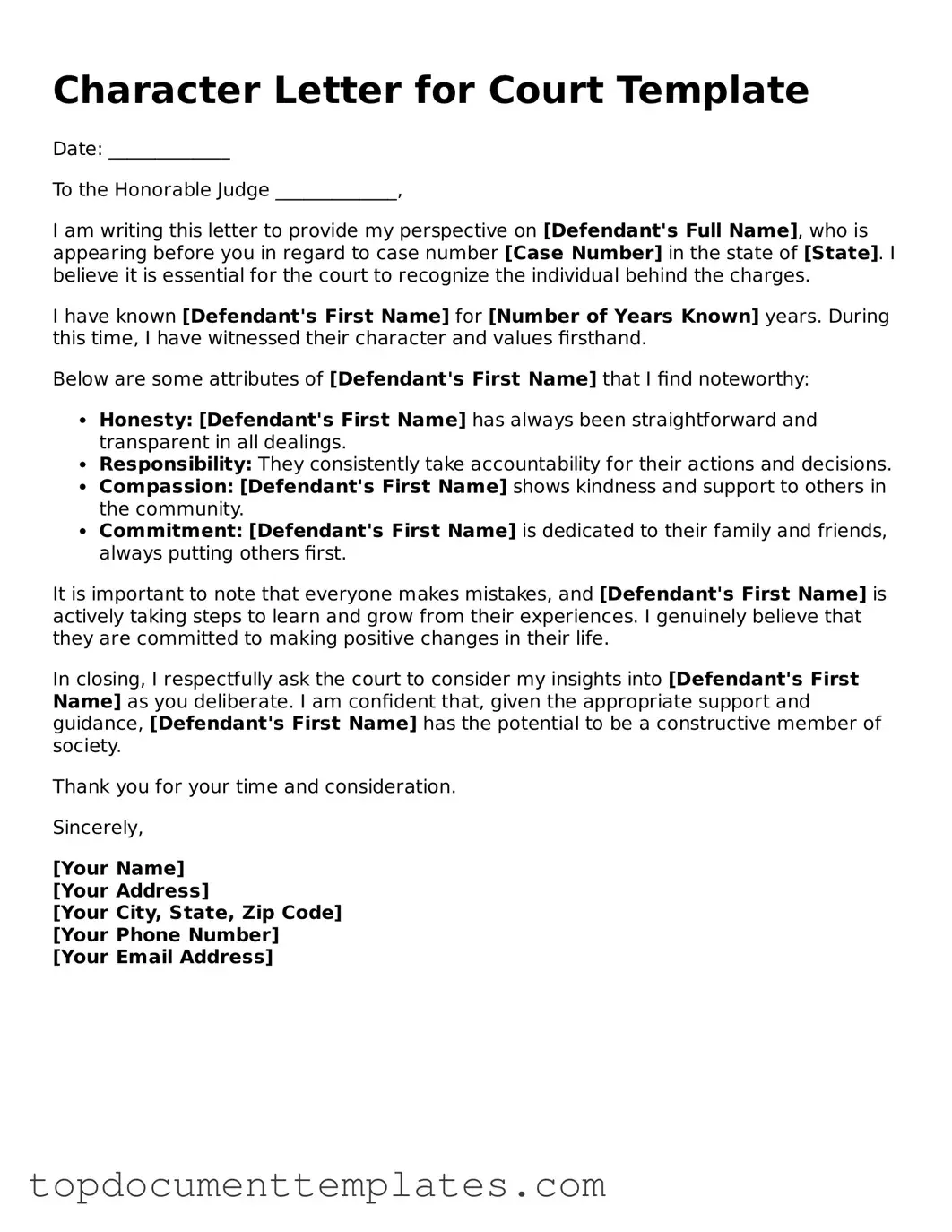Official Character Letter for Court Template
When navigating the complexities of the legal system, individuals often seek ways to present their character in a favorable light, particularly in court proceedings. A Character Letter for Court serves as a vital tool in this endeavor, allowing friends, family, or colleagues to articulate their personal experiences and observations about the individual in question. This letter typically addresses the character traits, values, and behaviors of the person facing legal scrutiny, providing context that can influence a judge’s perception. It is essential for the letter to be sincere and specific, highlighting instances that demonstrate the individual’s integrity, responsibility, and contributions to the community. Additionally, the letter should be structured appropriately, including a clear introduction, a body that elaborates on the individual’s positive attributes, and a respectful conclusion. By presenting a well-crafted Character Letter, the writer not only supports the individual but also reinforces the importance of character in the judicial process.
Similar forms
-
Reference Letter: A reference letter serves a similar purpose by providing insight into a person's character. It is often written by someone who knows the individual well, highlighting their positive traits and contributions.
- Recommendation Letter Form: This is a valuable document used for endorsing individuals in various contexts, such as academic and professional settings. To learn more about how to effectively utilize this form, visit fillable-forms.com/blank-recommendation-letter.
-
Recommendation Letter: Like a character letter, a recommendation letter emphasizes a person's abilities and character. It is typically used in job applications or academic settings, showcasing the individual's strengths.
-
Personal Statement: A personal statement often includes reflections on one's character and experiences. It is commonly required for college applications and can provide a narrative about the individual’s background.
-
Affidavit of Character: An affidavit of character is a sworn statement that attests to a person's character. It is legally binding and often used in court to support a person's credibility.
-
Character Witness Statement: This document is similar in that it provides a testimony about a person's character. It is typically presented in court to support the individual during legal proceedings.
-
Community Service Letter: A community service letter outlines an individual’s involvement in volunteer activities. It reflects their commitment to helping others and showcases their positive traits.
Guidelines on Writing Character Letter for Court
Filling out the Character Letter for Court form requires careful attention to detail. This letter serves as a personal statement that reflects your understanding of the individual’s character and the circumstances surrounding their situation. Follow these steps to ensure you complete the form accurately and effectively.
- Begin with your name, address, and contact information at the top of the letter.
- Date the letter appropriately.
- Include the recipient's name, title, and address, if known.
- Start the letter with a formal greeting, such as "Dear [Judge's Name]" or "To Whom It May Concern."
- Introduce yourself and explain your relationship with the individual in question. Be specific about how long you have known them and in what capacity.
- Provide a detailed description of the individual's character. Highlight positive traits and any relevant experiences that showcase their character.
- If applicable, mention any contributions the individual has made to the community or their personal achievements.
- Address the circumstances surrounding the court case briefly, but focus on the individual's character rather than the legal issues.
- Conclude with a strong statement of support, expressing your belief in the individual’s potential for positive change.
- End the letter with a formal closing, such as "Sincerely," followed by your name and signature.
File Information
| Fact Name | Description |
|---|---|
| Purpose | A Character Letter for Court is used to provide the court with insight into a person's character and reputation, often to support a defendant or a party in a legal case. |
| Format | Typically, the letter should be written in a formal business letter format, including the writer's contact information, date, and the court's address. |
| Content | It should include specific examples of the person's character traits, behaviors, and contributions to the community, providing context for the court. |
| Length | Character letters are generally one to two pages long, ensuring that they are concise yet informative. |
| Signature | The letter must be signed by the writer, affirming the authenticity of the statements made within. |
| State-Specific Laws | In some states, such as California, character letters may be governed by specific rules regarding evidence and admissibility in court. |
| Submission | These letters are typically submitted to the court prior to a hearing, often as part of a larger set of documents supporting a case. |
| Impact | A well-written character letter can positively influence a judge's perception and decision-making regarding the case. |
Find Other Types of Character Letter for Court Templates
Adoption Recommendation Letter - A note on the applicant's patience and understanding with children.
Sample Letter of Good Moral Character for Immigration - The document emphasizes the applicant's integrity in all aspects of life, both professionally and personally.
